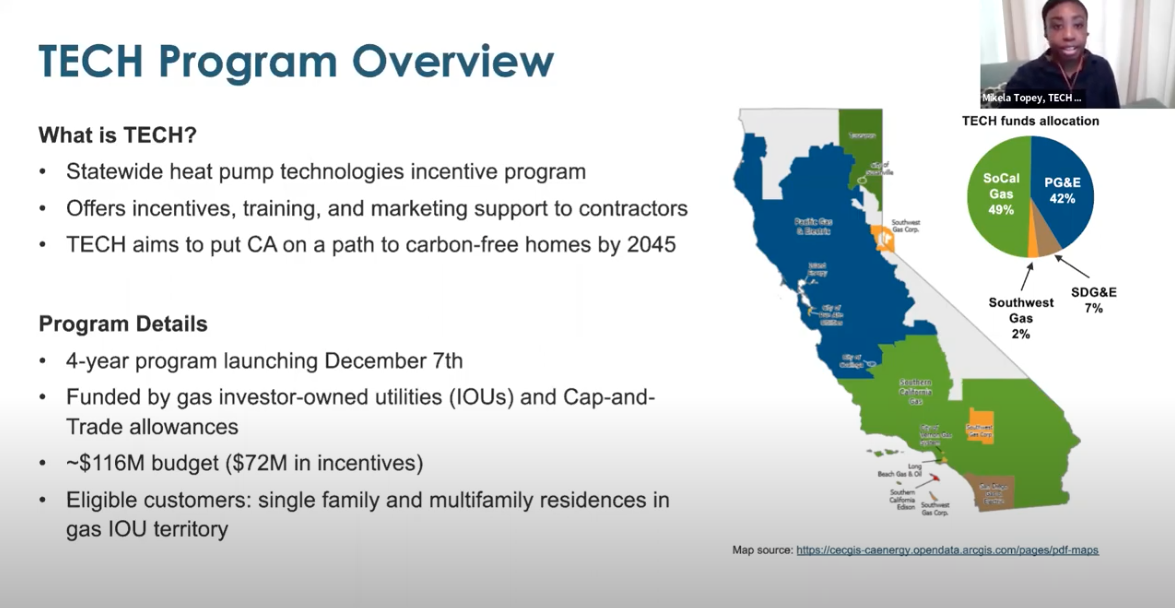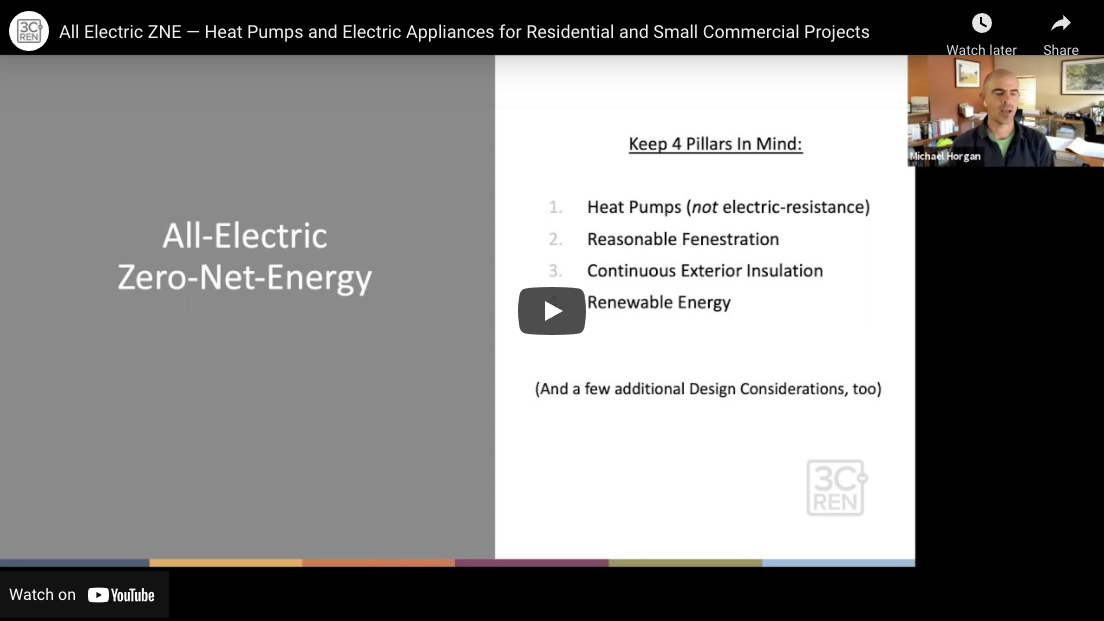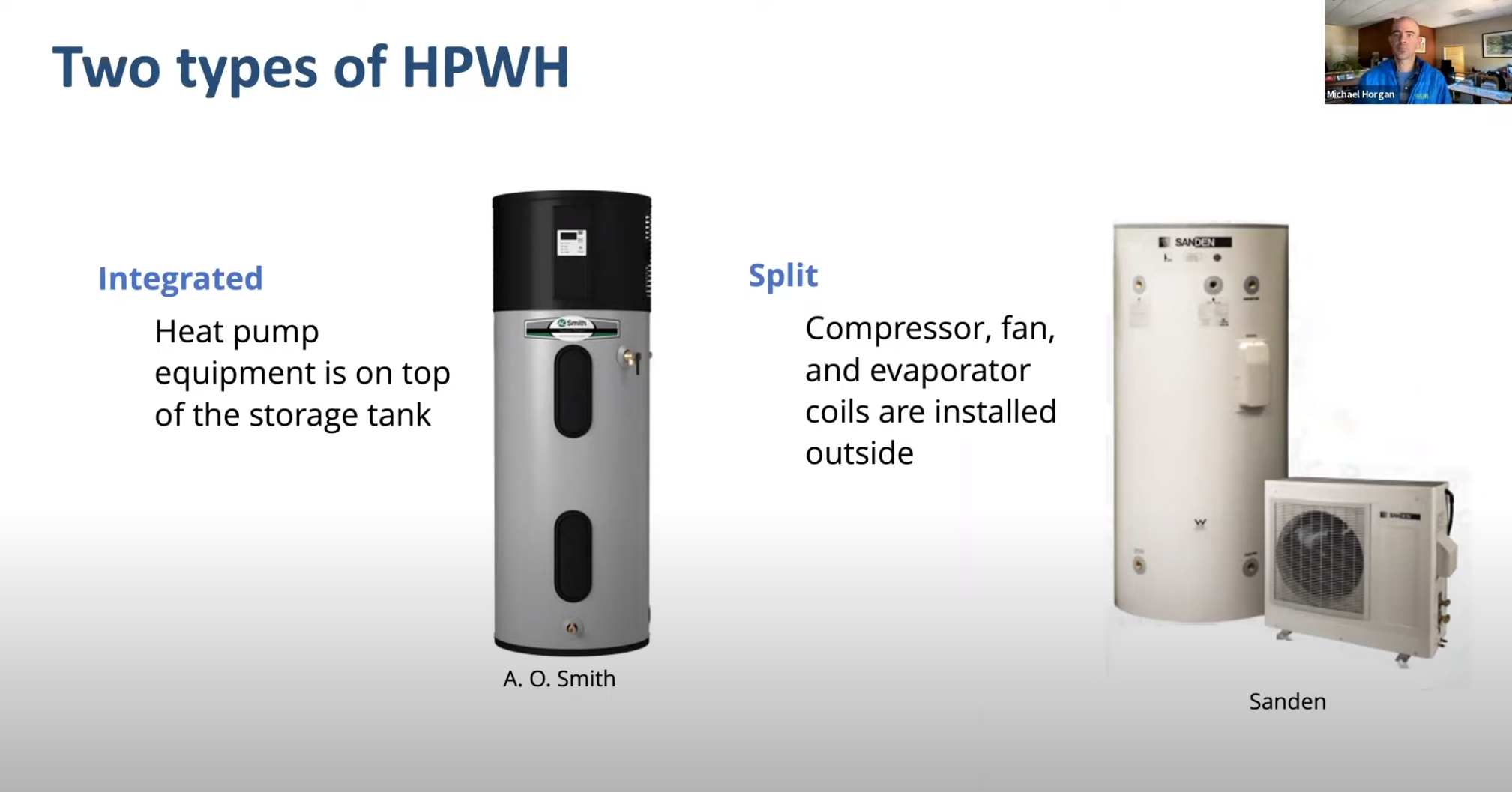Energy Code Implementation: Accessory Dwelling Unit (ADUs)

Having gained a solid understanding of high-performance building enclosures from classes 1 through 3 in 3C-REN’s High Performance Fundamentals series, participants are well-prepared for this class, which will provide a foundation in the use of heat pumps for both space conditioning (heating and cooling) and water heating. The class will cover what a heat pump is and explain why heat pumps are essential elements of high performance buildings. Special attention will be paid to refrigerants: how heat pumps use them, how to avoid leaks through proper installation, and why it’s important to avoid leaks due to the damage they can cause to contractor profitability and the planet. An overview will be provided to aid in selecting, sizing, installing, and commissioning heat pump equipment, so that it performs as intended. Note: You are not required to have attended classes 1 through 3 to attend this event.
TECH Clean California Program Overview

TECH Clean California is a new program offering generous incentives for heat pump technology used for space and water heating–think equipment like mini-split HVAC units and heat pump water heaters.
Heat Pump Water Heaters and the Energy Code

We’ll walk through the basics of heat pump water heaters (HPWH) for homes and provide critical compliance information for the California Energy Code 2019 Residential Standards. We’ll cover why we are seeing HPWHs in the code now, how they are different from other types of water heaters, highlight the benefits and some potential constraints, and review how designers, builders, installers, and code officials would document a HPWH for Energy Code compliance, with specific focus on single family homes or where one HPWH serves one dwelling.
Higher Performance Building on the Central Coast, All Electric Construction, Part 2: Heat Pump Water Heaters and Other Electric Appliances

Gain clarity and expertise on today’s higher performance all-electric construction. Part 2 of our two-part series will focus on heat pump water heaters and other electric appliances. Topics will include why heat pumps are quickly becoming the preferred system for heating water, how they work, design considerations, sticking points and solutions, as well as cost variables. Emphasis will be on residential, multi-family and small commercial on the Central Coast or similar climates.
Higher Performance Building on the Central Coast, All Electric Construction, Part 1: Heat Pumps for Heating and Cooling

Gain clarity and expertise on today’s higher performance all-electric construction. Part 1 of our two-part series will focus on heat pumps for space conditioning. Topics will include why heat pumps are quickly becoming the preferred system for heating and cooling, how they work, design considerations, sticking points and solutions, as well as cost variables. Emphasis will be on residential, multi-family and small commercial on the Central Coast or similar climates.
All Electric ZNE – Heat Pumps and Electric Appliances for Residential and Small Commercial Projects

Construction in California is moving toward cost-effective, all-electric systems, without natural gas. This class will discuss the benefits and potential barriers to integration of all all-electric systems.
Heat Pump Water Heaters for Energy Code (Private Sector)

We’ll walk through the basics of heat pump water heaters (HPWH) for homes and provide critical compliance information for the California Energy Code 2019 Residential Standards. We’ll cover why we are seeing HPWHs in the code now, how they are different from other types of water heaters, highlight the benefits and some potential constraints, and review how a designer and/or builder/installer would document a HPWH for Energy Code compliance, with specific focus on single family homes or where one HPWH serves one dwelling.
Heat Pump Water Heaters for Energy Code (Public Sector)

As heat pump water heaters become more popular in residential applications, building departments need to be able to identify HPWHs on compliance documentation and in field, as well as understand how to enforce compliance with the California Energy Code 2019 Residential Standards.. This course will describe how to identify HPWHs and what the code requirements are for installation, with a specific focus on single family homes or where one HPWH serves one dwelling.
